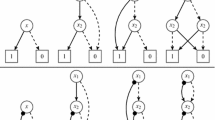Abstract
Set sharing is an abstract domain in which each concrete object is represented by the set of local variables from which it might be reachable. It is a useful abstraction to detect parallelism opportunities, since it contains definite information about which variables do not share in memory, i.e., about when the memory regions reachable from those variables are disjoint. Set sharing is a more precise alternative to pair sharing, in which each domain element is a set of all pairs of local variables from which a common object may be reachable. However, the exponential complexity of some set sharing operations has limited its wider application. This work introduces an efficient implementation of the set sharing domain using Zero-supressed Binary Decision Diagrams (ZBDDs). Because ZBDDs were designed to represent sets of combinations (i.e., sets of sets), they naturally represent elements of the set sharing domain. We show how to synthesize the operations needed in the set sharing transfer functions from basic ZBDD operations. For some of the operations, we devise custom ZBDD algorithms that perform better in practice. We also compare our implementation of the abstract domain with an efficient, compact, bitset-based alternative, and show that the ZBDD version scales better in terms of both memory usage and running time.
Preview
Unable to display preview. Download preview PDF.
Similar content being viewed by others
References
Bacon, D.F., Sweeney, P.F.: Fast static analysis of C++ virtual function calls. In: Proc. of OOPSLA 1996, SIGPLAN Notices, October 1996, vol. 31(10), pp. 324–341 (1996)
Berndl, M., Lhoták, O., Qian, F., Hendren, L., Umanee, N.: Points-to Analysis Using BDDs. In: Proceedings of the ACM SIGPLAN 2003 Conference on Programming Language Design and Implementation, pp. 103–114. ACM Press, New York (2003)
Bryant, R.E.: Symbolic Boolean Manipulation with Ordered Binary-Decision Diagrams. ACM Comput. Surv. 24(3), 293–318 (1992)
Codish, M., Søndergaard, H., Stuckey, P.J.: Sharing and groundness dependencies in logic programs. ACM Transactions on Programming Languages and Systems 21(5), 948–976 (1999)
Coudert, O.: Solving Graph Optimization Problems with ZBDDs (1997)
Cousot, P., Cousot, R.: Abstract Interpretation: a Unified Lattice Model for Static Analysis of Programs by Construction or Approximation of Fixpoints. In: Fourth ACM Symposium on Principles of Programming Languages, pp. 238–252 (1977)
Dean, J., Grove, D., Chambers, C.: Optimization of Object-Oriented Programs Using Static Class Hierarchy Analysis. In: Olthoff, W. (ed.) ECOOP 1995. LNCS, vol. 952, pp. 77–101. Springer, Heidelberg (1995)
Minato, S.I.: Zero-Suppressed BDDs for Set Manipulation in Combinatorial Problems. In: DAC, pp. 272–277 (1993)
Minato, S.I.: Binary Decision Diagrams and Applications for VLSICAD. Kluwer, Norwell (1996)
Minato, S.I.: Zero-suppressed BDDs and their Applications. STTT 3(2), 156–170 (2001)
Jacobs, D., Langen, A.: Accurate and Efficient Approximation of Variable Aliasing in Logic Programs. In: North American Conference on Logic Programming (1989)
JProfiler, http://www.ej-technologies.com/products/jprofiler/
Leroy, X.: Java bytecode verification: algorithms and formalizations. Journal of Automated Reasoning 30(3-4), 235–269 (2003)
Lhoták, O., Curial, S., Amaral, J.N.: Using ZBDDs in Points-to Analysis. In: Proceedings of the 20th International Workshop on Languages and Compilers for Parallel Computing (2007)
Meinel, C., Theobald, T.: Algorithms and Data Structures in VLSI Design. Springer, New York (1998)
Méndez-Lojo, M., Hermenegildo, M.: Precise Set Sharing Analysis for Java-style Programs. In: Logozzo, F., Peled, D.A., Zuck, L.D. (eds.) VMCAI 2008. LNCS, vol. 4905, pp. 172–187. Springer, Heidelberg (2008)
Muthukumar, K., Hermenegildo, M.: Determination of Variable Dependence Information at Compile-Time Through Abstract Interpretation. In: 1989 North American Conference on Logic Programming, pp. 166–189. MIT Press, Cambridge (1989)
Muthukumar, K., Hermenegildo, M.: Combined Determination of Sharing and Freeness of Program Variables Through Abstract Interpretation. In: 1991 International Conference on Logic Programming, pp. 49–63. MIT Press, Cambridge (1991)
Payet, É., Spoto, F.: Magic-Sets Transformation for the Analysis of Java Bytecode. In: Riis Nielson, H., Filé, G. (eds.) SAS 2007. LNCS, vol. 4634, pp. 452–467. Springer, Heidelberg (2007)
Somenzi, F.: CUDD: CU Decision Diagram Package (2005), http://vlsi.colorado.edu/~fabio/CUDD/cuddIntro.html
Vahidi, A.: JDD: A Pure Java BDD Library (2008), http://javaddlib.sourceforge.net/jdd/index.html
Whaley, J., Lam, M.S.: Cloning-based context-sensitive pointer alias analysis using binary decision diagrams. In: PLDI, pp. 131–144. ACM, New York (2004)
Yoneda, T., Hatori, H., Takahara, A., Minato, S.I.: BDDs vs. Zero-Suppressed BDDs: for CTL Symbolic Model Checking of petri nets. In: Srivas, M., Camilleri, A. (eds.) FMCAD 1996. LNCS, vol. 1166, pp. 435–449. Springer, Heidelberg (1996)
Zhu, J.: Symbolic Pointer Analysis. In: ICCAD, pp. 150–157 (2002)
Zhu, J., Calman, S.: Symbolic Pointer Analysis Revisited. In: PLDI, pp. 145–157 (2004)
Author information
Authors and Affiliations
Editor information
Editors and Affiliations
Rights and permissions
Copyright information
© 2008 Springer-Verlag Berlin Heidelberg
About this paper
Cite this paper
Méndez-Lojo, M., Lhoták, O., Hermenegildo, M.V. (2008). Efficient Set Sharing Using ZBDDs. In: Amaral, J.N. (eds) Languages and Compilers for Parallel Computing. LCPC 2008. Lecture Notes in Computer Science, vol 5335. Springer, Berlin, Heidelberg. https://doi.org/10.1007/978-3-540-89740-8_4
Download citation
DOI: https://doi.org/10.1007/978-3-540-89740-8_4
Publisher Name: Springer, Berlin, Heidelberg
Print ISBN: 978-3-540-89739-2
Online ISBN: 978-3-540-89740-8
eBook Packages: Computer ScienceComputer Science (R0)




